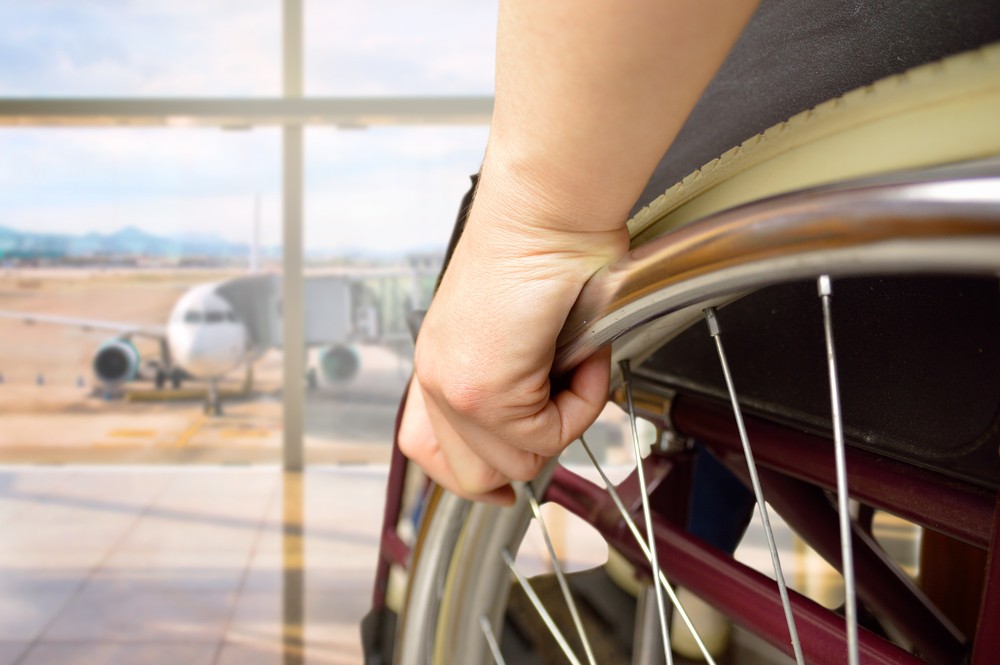Popular Reads
Top Results
Can't find what you're looking for?
View all search resultsPopular Reads
Top Results
Can't find what you're looking for?
View all search resultsSocial initiative helps disabled travelers get home safely for Christmas
Change text size
Gift Premium Articles
to Anyone
C
hristmas is just around the corner. As families are preparing food checklists and churches are setting up bright lights and decoration, many people with disabilities mull a basic-yet-complicated question: How do I get home for Christmas?
One of them is Jujur Saragih, who lives in a social home for physically challenged people in Pondok Bambu, East Jakarta.
“It has been 15 years since I moved here from Medan [North Sumatra] and I have never once gone back home. I still miss my family members there, although some of them have visited me here once in a while,” the 39-year-old told The Jakarta Post on Saturday.
Jujur has always dreamed of spending Christmas with the whole family in Medan, but he fears for his safety when taking public transportation in Indonesia – most of which is not disabled-friendly.
Luckily, Jujur and some of his friends at the social home finally have an opportunity to fulfill their dream of celebrating the holiday with their families at home through a trip program organized by an initiative called Child and Disabled-Friendly Exodus (MRAD).
The civil movement was started in 2016 with a mission to accompany disabled people from Jakarta to their hometowns for the Idul Fitri holiday. After receiving many requests this year, MRAD has decided to bring the joy to those who celebrate Christmas.
Ilma Sovri Yanti, the mudik [exodus] trip initiator from MRAD, started the civil movement following her 2015 study on Indonesian hospitality toward people with disabilities. Her study found that the disabled faced many obstacles in accessing public transportation.
“Many wheelchair users complained of being rejected by ticket agencies saying that they had no proper access and facilities that could serve them on the trip,” said Ilma. “Therefore, we use the mudik topic to campaign for infrastructure [accessibility for the disabled].”
Ilma, with the help of lawmakers in House of Representatives Commission VIII, which oversees religious and social affairs, also conducted an audit on public transportation infrastructure and found that airports were best prepared to serve people with disabilities, and ports were least ready.
“While airports have officials that can guide wheelchair users from the waiting room to their seats though a special lane, at a harbor, it’s hard to get on a ship’s deck, because it only has steep stairs,” she said.
“At terminals and train stations, the service standard also needs to be improved, as many officials still need to learn about safety. Those on duty at train stations often do not notice people with disabilities who want to step in the train.”
She recalled a recent accident happening to fellow activist Fazlur Rahman at Cikini Station, Central Jakarta. The visually-impaired man accidentally fell through a platform gap when trying to board a train, even though he was under a station employee’s watch.
“For Indonesians, mudik is a tradition. However, many choose not to go home to gather with their family during the holiday, not because they do not have the money but because they are concerned that [means of transportation] do not allow for comfort and safety,” Ilma added.
“We do have Law No. 8/2016 concerning people with disabilities, but it is not implemented effectively.”
Ilma organized the first MRAD trip in 2016 by taking seven disabled travelers in a wheelchair-accessible car, provided by the West Java Transportation Agency, to their respective hometowns.
One of the travelers, Watini, 33, said MRAD gave her a sense of security, while previously she had often been treated unfairly when traveling alone to her hometown in Central Java’s Surakarta.
“I used to be cheated by scalpers at bus terminals who often immediately brought my belongings and forced me to pay dearly knowing that I could not fight back at all while in a wheelchair,” said Watini.
Watini also recalled the bitter experience of some of her friends who had been groped by people pretending to help them get on the bus.
MRAD head of organizers Ritson Manyonyo said 50 people had registered to take part in the mudik event running from Dec. 23 until Jan. 3.
“This year, we are collaborating with the Transportation Ministry, which has prepared three buses for wheelchair users and a number of regular buses for the visually-impaired, people with hearing limitations and those with intellectual disabilities,” said Ritson, who himself is visually impaired.
Of all the registered travelers, Jujur and 23 other travelers are planning take a plane to reach their hometowns in Sumatra, Kalimantan, Central Sulawesi, Bali, East Nusa Tenggara and Papua. However, they are still waiting for the ministry’s Air Transportation Directorate General to approve their funding proposal.
“Hopefully, this event will continue every year. The trip is not only aimed as an encouragement for the government to facilitate those with disabilities but also to change the public’s mindset that people with disabilities are obstacles. They face obstacles,” Ritson underlined.










